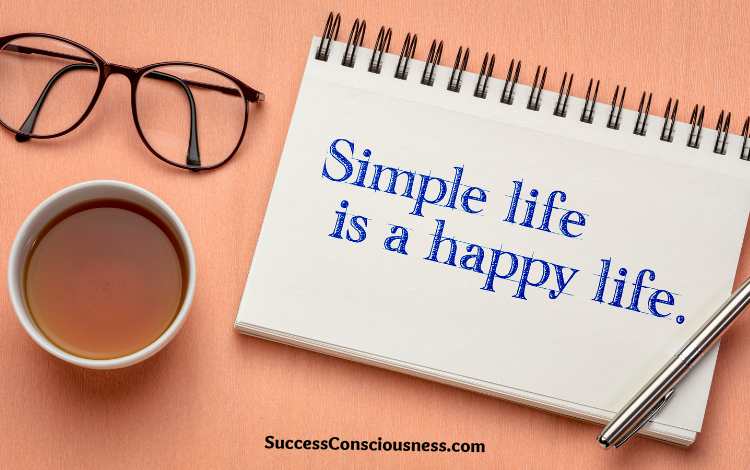
Discover the Joy of Less
Explore the profound impact of simplified living on personal happiness. This article delves into how reducing clutter, focusing on essential experiences, and leading a less materialistic life can significantly boost your well-being.
In an age dominated by consumer culture and digital overload, the allure of a simplified lifestyle is growing stronger.
The quest for happiness is often misconstrued as the need for more-more gadgets, more clothes, more commitments-might actually be fulfilled by embracing less.
- A mindset shift can free you from stress, overthinking, and emotional ups and downs. 'Emotional Detachment for a Happier Life' reveals powerful techniques to cultivate inner peace, mental clarity, true emotional freedom, and happiness. -
Learn How to Detach & Be Calm and Happy
Simplified living isn’t merely about decluttering your physical space but also about streamlining life’s complexities to focus on what truly matters. This approach can lead to greater contentment, reduced stress, and a clearer path to personal fulfillment.
1. The Psychological Benefits of Minimalism
The minimalist lifestyle, which emphasizes the reduction of unnecessary possessions, offers significant psychological benefits. Studies have shown that clutter can increase stress and affect your ability to focus.
Conversely, tidy and restrained spaces promote a sense of calm and control. Minimalism encourages you to prioritize quality over quantity, leading to a more deliberate and fulfilling use of your time and resources.
By stripping away the non-essential, individuals find more energy and clarity to invest in their passions and relationships, paving the way for a happier life.
2. Financial Freedom Through Simplification
One of the most tangible benefits of simplified living is financial freedom. Reducing material desires helps decrease the incessant urge to buy impulsively, leading to substantial savings and less financial stress. For instance, by opting to create pay stubs yourself instead of outsourcing, you not only save money but also gain a deeper understanding of your income and spending patterns.
Simplified living teaches you to appreciate experiences over possessions, which often results in more sustainable and rewarding spending habits.
3. Enhancing Relationships
Simplified living also has a profound impact on personal relationships. By reducing the time and energy spent on managing possessions and commitments, you free up more time for family and friends.
This lifestyle encourages deeper connections because it values presence over presents. A less cluttered life allows for spontaneous interactions and shared experiences that are often overshadowed by the hustle of a busy, materialistic lifestyle.
Additionally, the practices of empathy and mindfulness, often cultivated in a simplified lifestyle, can lead to more meaningful and supportive relationships.
4. Sustainable Living and Environmental Impact
Choosing a simplified lifestyle naturally aligns with environmentally sustainable practices. By consuming less and making more mindful choices about purchases, you contribute to reduced waste and lower environmental impact.
This aspect of simplified living not only benefits you but also the planet. It promotes a sense of responsibility and interconnectedness with the global community, enhancing personal fulfillment through ethical choices.
As more people embrace this way of life, the collective impact on the environment can lead to significant positive changes.
5. Personal Growth and Self-Discovery
Simplified living often leads to greater personal growth and self-discovery. As you declutter your environment and schedule, you’re also encouraged to introspect and identify what truly drives your happiness and sense of purpose.
This process can unearth passions and interests that were previously buried under the chaos of a more cluttered lifestyle.
Simplified living provides the space and freedom to experiment with new activities, learn new skills, and challenge old habits, fostering a journey of self-improvement that is both enriching and enlightening.
6. Reflection: What Can You Simplify?
As you contemplate the various benefits of simplified living, take a moment to reflect on your own life. What areas feel the most cluttered or chaotic? Is it your physical space, your schedule, or perhaps your digital life?
Consider the steps you could take to reduce these complexities. Could you declutter a room, prioritize your commitments, or even spend less time on electronic devices?
The journey to simplicity begins with these small but impactful decisions.
7. Practical Advice for Starting Your Simplified Life
Starting on the path to a simplified life can seem daunting, but it’s often simpler than it appears. Begin by setting small, achievable goals. You might start with a single drawer, a desktop, or your email inbox.
Celebrate the small victories as each step brings you closer to a more streamlined lifestyle.
Additionally, engage with communities or resources that advocate for minimalism and simplified living. These can provide support and inspiration as you make changes to better align with your values of simplicity and happiness.
Conclusion
Simplified living goes beyond the act of minimizing physical belongings-it’s about refocusing on the essentials that lead to true happiness and fulfillment.
By adopting minimalism, seeking financial independence, nurturing relationships, promoting sustainability, and pursuing personal growth, people can find profound satisfaction and peace.
This lifestyle choice is not about deprivation but about finding abundance in less and rediscovering the joys that a cluttered life may obscure.
Simplified living is not just a trend; it’s a sustainable path to a happier, more fulfilling life.

